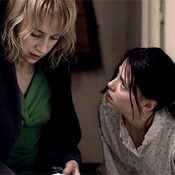- REVIEW
- READER REVIEWS
4 Months, 3 Weeks and 2 Days (4 luni, 3 saptamini si 2 zile)
|
|
Genre
Drama
Producer
Cristian Mungiu, Oleg Mutu
Distributor
IFC First Take
Release Date
Jan 25, 2008
Release Notes
NY
Official Website
Review
In Cristian Mungiu’s 4 Months, 3 Weeks and 2 Days, the camera fastens on a Romanian university student, Otilia (Anamaria Marinca), as she negotiates on behalf of her pretty, childlike roommate Gabita (Laura Vasiliu), who wants an abortion but has somehow left the logistics to her friend. Yet this isn’t a movie of isolating close-ups. Otilia is either dwarfed by the space or squeezed by it, adrift or oppressed by walls and ceilings. Those negotiations—with sadistically indifferent hotel clerks, the predatory male abortionist, even the well-off boyfriend who insists on her presence at his mother’s birthday dinner—are gruelingly drawn out, rife with humiliations small, not so small, and vast. All abortion is illegal here, but this late in the term—four months, three weeks, etc.—the penalties are fierce, and so is the potential for a fatal infection. Otilia’s powerlessness is more and more palpable, and as she struggles to keep her focus, the camera remains transfixed. So do we. It’s 1987, two years before the overthrow of the Stalinist dictator Nicolae Ceausescu, a time of shortages and cynicism, and Otilia’s dogged composure becomes increasingly heroic. We want her not just to survive, but to survive with her humanity intact.
Momentous things happen to a culture when its people wake up from decades of enforced stupor. After the “Hey, we no longer need to toe the party line or encode our meanings—let’s get naked!” phase comes the autopsy: the depiction, lest anyone forget, of what happened to people, on the outside and the inside, under a repressive régime. The frigid stoicism of 4 Months, 3 Weeks and 2 Days barely contains the filmmaker’s fury. It’s a movie that centers on the subjugation of women, but the plight of Otilia and Gabita is also a window on a world in which everyone is stunted, in which fear has metastasized into malignant self-interest.
The danger, of course, is that the characters will come to seem like specimens in a jar—or fish in an aquarium, which is the first thing you see in the film and which briefly sent my metaphor meter into the red zone. But it’s fascinating to study the ways in which these particular sea creatures have adapted. Even the monstrously exploitative abortionist, Bebe (Vlad Ivanov), becomes a figure of wonderment: He has a shtick, and it hinges on the belief that his clients regard him as a moron and will always seek to take advantage of him. We know how he justifies his actions to himself; we even see a glimmer of humanity when his job is done and no one is in a position to screw him over. We don’t forgive him, but we understand how he evolved.
Last year’s The Death of Mr. Lazarescu depicted a similarly dead-souled Romania, seen through the prism of a poor, disagreeable old man’s last hours as he’s shuttled from one uncaring medical facility to the next. Its unemotional “objectivity” triggered the same horror in audiences, but the director took cheap shots at most of his characters (overworked, underpaid medical personnel), and the movie was basically a single sick joke stretched to three hours. 4 Months, 3 Weeks and 2 Days portrays a more complex ecosystem. Cigarettes are fetishized: Otilia can never find her precious Kents on the black market; she’s frustrated even in repose, puffing futilely. Mungiu moves between huge, empty, decrepit buildings (once presumably glorious) and characterless modern apartment towers: It’s almost impossible to reconcile the past with the present. There’s no music—only the thunk of radiators, the echo of shoes on uncarpeted floors, and, unforgettably, the sound of a small object as it bumps down a garbage chute.
Mungiu goes a bit over the top in the last scene, in which the protagonists are presented with a dish of brains and innards in a hotel restaurant. It’s meant to underscore the grisly centerpiece of the film and the offal-ridden vision of Romania circa 1987. The coup de grâce is especially graceless because everything we know is already visible in Marinca’s eyes. The actress is extraordinary. She can barely look at her pip-squeak-voiced roommate, who isn’t bad—just weak and self-centered. She can’t look at the disgusting plate. A gaze at the heavens would probably make her scream and bring police. She looks at nothing and smokes her non-Kents. There isn’t a trace of tremulousness—the more frozen her face, the more of her soul lies bare. That’s true of this remarkable movie, too.
